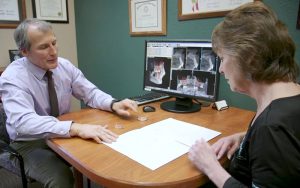Preparing for Wisdom Teeth Complications
Is the thought of wisdom teeth removal keeping you up at night? Understanding the possible wisdom teeth removal complications associated with this procedure can help alleviate your fears and prepare you for recovery.
Our Loveland, CO dentist, Dr. Howard, goes over the postoperative complications that can occur. While these are rare, it’s best to be prepared. Contact our dental office today at (970) 669-3918 with any questions.
Possible Complications of Wisdom Tooth Removal
Dry Socket and Blood Clot Issues
A dry socket is a painful condition that occurs when a blood clot is displaced from the extraction site, exposing the underlying bone and nerves and increasing the risk of infection.
Certain factors, such as smoking or using a straw to drink beverages, can increase the risk of dry sockets. Smokers and women taking birth control pills are more likely to experience this complication.
Nerve Injury
Nerve injury is a potential risk during the procedure, which may result in temporary or permanent changes in sensation in the lower lip, chin, gums, and tongue. Although the risk of nerve damage is relatively low, it can still cause severe pain and discomfort. In most cases, nerve damage is temporary and resolves within several weeks or months, sometimes even within five days.
Infection and Healing Challenges
Infections can develop after your wisdom teeth surgery, causing swelling, pain, and other symptoms that require medical attention. If left untreated, these infections can lead to more severe complications.
Restricted Jaw Movement
Restricted jaw movement, or trismus, is a common complication after the removal of wisdom teeth due to the involvement of jaw muscles during surgery. Individuals between the ages of 17 and 25 are particularly prone to trismus after removal. Your dentist may suggest a variety of treatments to address trismus.
 Excessive Bleeding
Excessive Bleeding
Excessive bleeding and clotting concerns can arise after a wisdom teeth procedure, requiring proper care and monitoring. Avoiding smoking, rinsing the mouth with salt water, and consuming soft foods are necessary to control bleeding. Monitor the bleeding after the procedure, and consult your dentist or oral surgeon if it persists after 24 hours or is unusually heavy. To prevent further bleeding, refrain from rinsing, spitting, or using a straw on the day of surgery.
Sinus Complications
Sinus complications, such as sinus communication, can occur after wisdom tooth removal, especially if the tooth is close to the sinus cavity. Sinus communication refers to an opening between a tooth socket and a sinus cavity, which can cause complications during recovery.
When to Consult a Dental Professional
Consulting with your dentist is crucial if you experience signs of infection, persistent pain, or other symptoms after your wisdom teeth removal.
- Monitoring for Infection: Observing for signs of infection post-wisdom tooth removal is critical to guarantee proper healing and avoid complications.
- Persistent Pain and Discomfort: Persistent pain and discomfort after your wisdom teeth surgery may indicate complications such as dry socket, nerve damage, or infection.
If you experience ongoing pain, contact our dentist as soon as possible. By being proactive and well-informed, you can ensure a smoother healing process and minimize the risks associated with wisdom teeth removal.
Frequently Asked Questions
Complications from wisdom tooth removal are fairly rare. Permanent problems such as numbness or damage to nearby teeth occur in up to 1 out of 100 patients. Most wisdom tooth extractions don’t result in long-term complications.
The most common complication after tooth extraction is a dry socket, where the blood clot formed in the socket is dislodged and exposes the jawbone. This can cause intense pain and slowed healing, and can be treated by a dental professional.
Contact Our Dentist if Complications Arise After Getting Your Wisdom Teeth Removed
Understanding the potential complications of wisdom teeth removal, taking steps to reduce risks, and knowing when to contact our dental professionals are essential for a successful recovery and avoid tooth decay or pain.
To schedule an appointment, contact our Loveland dental office at (970) 669-3918. We welcome patients from Boulder, Fort Collins, and Evans.
